 HL7 PA, R2-2010 HL7 Version 3 Standard: Patient Administration, DSTU Release 2 Update February 2010 Update to DSTU Release 2 |
Content Last Edited: 2011-06-17T13:44:56
10.2 Storyboards
10.3 Application Roles
10.4 Trigger Events
10.5 Refined Message Information Models
10.6 Hierarchical Message Descriptions
10.7 Interactions
A central event in the provision of health care is the patient encounter. Patient encounter is defined as an interaction between a patient and one or more healthcare participants for the purpose of providing patient services or assessing the health status of a patient. Examples of a patient encounter are an outpatient visit to multiple departments, home health support (including physical therapy), an inpatient hospital stay, an emergency room visit, a field visit (e.g., traffic accident), an office visit, occupational therapy, or a telephone call between a patient and a healthcare practitioner.
This document defines standards for information interchanges with home health encounter information systems. A home health encounter is where services are provided or supervised by a practitioner at the patient's residence. Services may include recurring visits for chronic or terminal conditions or visit(s) facilitating recuperation. HL7 version 2.x does not include any equivalent messages in its ADT chapter.
HL7v3 describes three interoperability paradigms - messages, documents and services. This document defines information interchanges in the message paradigm.
Information interchanges can be broadly categorized by the goal of the interchange - notification (no specific receiver responsibility), query (receiver expected to return information meeting query criteria) and action request (receiver expected to take requested action). This document defines notification interchanges. Query interactions are defined in the Encounter Queries topic. No action request interactions have yet been defined for this topic.
This document addresses notifications for the following:
- Home health encounter appointment created
- Home health encounter appointment rescheduled
- Home health encounter appointment revised
- Home health encounter appointment canceled
- Home health encounter started
- Home health encounter revised
- Home health encounter completed
- Home health encounter aborted
- Home health encounter nullified (remove erroneous record)
The Patient Administration work group limited scope in this document by:
- Limiting storyboards to the simplest cases
- Excluding notification messages for state transitions "reactivate" and to/from "suspended" (see the Act State Diagram for Patient Administration Messages below; the unsupported states and transitions are grayed out in the diagram)
- Excluding action request interactions
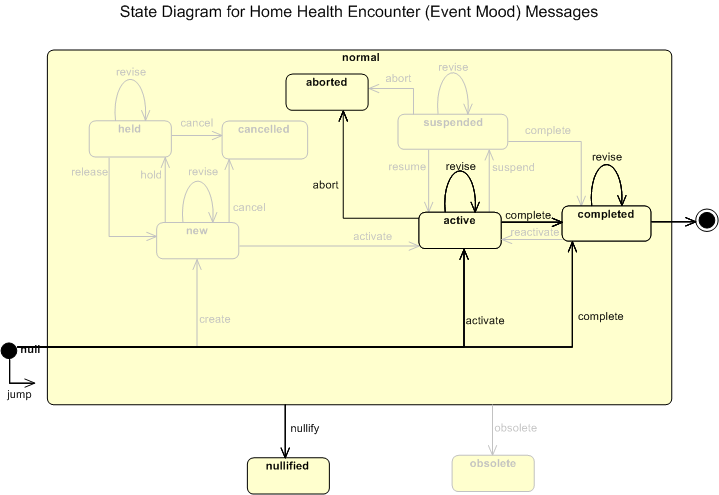
The Patient Administration Technical Committee invites implementers with additional requirements to submit content proposals for future releases of the standard.
This specification is defined for the universal realm. As a consequence, many attributes are bound to concept domains and many attributes and associations are left as optional. See the Refinement, Constraint and Localization section of HL7v3 for guidance on how to create a profile from this document.
The Patient Administration work group has not attempted to implement this content in either the document or services interoperability paradigms. The work group is interested in hearing from implementers who are considering exchanging this content in one of those paradigms.
This document was previously published as DSTU in 2007 and it is being issued as an updated DSTU again due to the lack of feedback from implementers. The Patient Administration work group wants to hear from implementers regarding the suitability for use of this content.
|
||||||||||||
|
For details on the interpretation of this section, see the storyboard discussion in the Version 3 Guide.
This storyboard demonstrates the basic flow of a home health encounter from scheduled, through active, to completed.
Exceptional events are described in other storyboards.
- Canceling a home health appointment is covered in Cancel Home Health Encounter Appointment.
- Abnormal termination of an active home health encounter is covered in Abort Home Health Encounter.
- Nullifying an erroneously reported home health encounter is covered in Nullify Home Health Encounter.
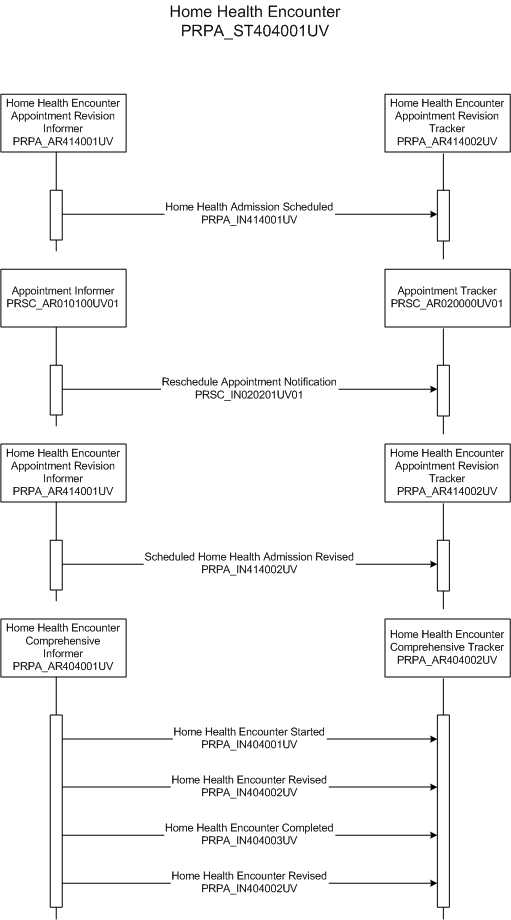
| Home Health Encounter Appointment Scheduled | |
| Home Health Encounter Appointment Revised | |
| Home Health Encounter Started | |
| Home Health Encounter Revised | |
| Home Health Encounter Completed |
Schedule Home Health
Adam Everyman has been an inpatient at Good Health Hospital for the past five days. His physician decided to discharge Mr. Everyman but felt he needed home health follow up. The Home Health Care Agency scheduled a nurse and a time to evaluate Mr. Everyman. The Agency scheduled the visit for the day Mr. Everyman was scheduled to go home [Interaction Home Health Encounter Appointment Scheduled].
Reschedule Home Health
The day Mr. Everyman was scheduled to go home he developed a fever and his inpatient discharge was delayed for a day. This was communicated to the Home Health Care Agency coordinator who rescheduled Mr. Everyman's first home health visit [Interaction Reschedule Appointment Notification].
Revise Scheduled Home Health
Later, Adam Everyman called Hannah Helpful, the Home Health Care Agency clerk, and informed her that he needed to change his emergency contact information. His daughter was going away on vacation and so he wanted her to put his son, James Everyman, down as the emergency contact and he provided Hannah with James' phone number and address [Interaction Home Health Encounter Appointment Revised].
Start Home Health Encounter
The Home Health Care Agency nurse arrived at Mr. Everyman's home at the scheduled date and time to assess his status and admitted him into the system [Interaction Home Health Encounter Started].
Revise Active Home Health Encounter
When Hannah Helpful, the Home Health Care Agency clerk previously updated Mr. Everyman's emergency contact information, she had entered the phone number for James Everyman incorrectly. When the information was reviewed with Adam Everyman, he pointed out that the emergency contact phone number was incorrect. The Home Health Care Agency nurse noted the change and the patient record was updated. [Interaction Home Health Encounter Revised].
Complete Home Health Encounter
Dr. Patricia Primary decided that Adam Everyman's condition had improved such that he no longer needed home health services. On orders from Dr. Primary, the Home Health Care Agency discharged Mr. Everyman [Interaction Home Health Encounter Completed].
Post Home Health Encounter
After completion of Adam Everyman's home health visits, a post discharge review by the Home Health Care Agency Medical Records director discovered a diagnosis coding error. She entered the record and revised the coding to accurately reflect the diagnosis [Interaction Home Health Encounter Revised].
This storyboard demonstrates canceling a home health encounter appointment.
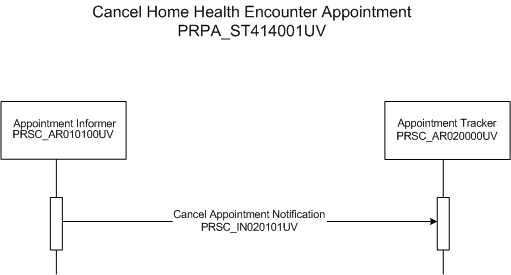
Dr. Primary decided that Mr. Everyman's condition had improved such that he did not need the home health services she had scheduled. Dr. Primary informed Mr. Everyman and the Home Health Care Agency of the change. The Home Health Agency canceled Mr. Everyman's scheduled appointment. [Interaction Cancel Appointment Notification].
This storyboard demonstrates abnormal termination of a home health encounter.
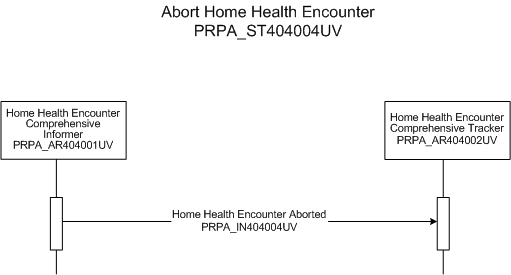
| Home Health Encounter Aborted |
Adam Everyman was a patient receiving home health services from the Home Health Care Agency. On Tuesday the HHCA visiting nurse was in the middle of her weekly visit with Mr. Everyman when she received an urgent page to see another patient in the neighborhood. The nurse arranged to return to see Mr. Everyman in two days and then left [Interaction Home Health Encounter Aborted].
This storyboard demonstrates nullifying an erroneously reported home health encounter.
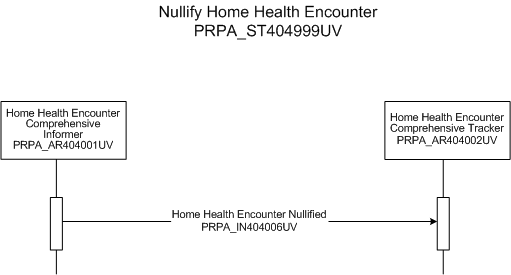
| Home Health Encounter Nullified |
Adam Everyman was discharged from the hospital. Home health services were requested by his physician. The Home Health Care Agency intake nurse saw Mr. Everyman and determined that he could benefit from home health visits. Once at home the HHCA nurse met Mr. Everyman, registered him and scheduled his appointments. But, before the next visit occurred, the nurse found that two home health encounters were recorded for Mr. Everyman. One of the duplicate encounters was marked as "entered in error" and was nullified [Interaction Home Health Encounter Nullified].
|
||||||||||||
|
For details on the interpretation of this section, see the discussion of application roles and their relationships in the Version 3 Guide.
A Home Health Encounter Appointment Revision Informer sends appointment activate and revise notifications. Additional appointment notifications such as reschedule and cancel are sent by the Appointment Informer application role.
A Home Health Encounter Appointment Revision Tracker receives appointment activation and revision notification messages. Additonal appointment notifications such as rescheduled and canceled are received by the Appointment Tracker application role.
|
||||||||||||||||||
|
For details on the interpretation of this section, see the discussion of trigger events in the Version 3 Guide.
| Type: | State-transition based |
| State Transition: | HomeHealthEncounterAppointment (PRPA_RM414001UV02) |
This trigger event signals that an appointment for a home health encounter was scheduled.
The Schedule Home Health Encounter trigger event is most closely aligned with the HL7 2.4 SIU^S12 - notification of new appointment booking event for a home health visit.
| Type: | State-transition based |
| State Transition: | HomeHealthEncounterAppointment (PRPA_RM414001UV02) |
This trigger event signals that an appointment for a home health encounter was revised before the appointment began.
The Revise Home Health Encounter Appointment trigger event is most closely aligned with the HL7 2.4 SIU^S14 - notification of appointment modification event for a home health visit.
| Type: | State-transition based |
| State Transition: | HomeHealthEncounterEvent (PRPA_RM404001UV02) |
This trigger event signals that a new home health encounter has started. The healthcare practitioner arrived at the patients home. If there was an appointment for this encounter then this trigger event also implicitly changes the status of the appointment to completed.
The Begin Home Health Encounter trigger event is most closely aligned with the HL7 2.4 ADT^A04 - register a patient event signaling the start of a home health encounter. However, version 2 does not specify events or messages specific to home health care.
| Type: | State-transition based |
| State Transition: | HomeHealthEncounterEvent (PRPA_RM404002UV02) |
This trigger event signals that information about a home health encounter has changed.
The Revise Home Health Encounter trigger event is most closely aligned with the HL7 2.4 ADT^A08 - update patient information event for a home health care patient. However, version 2 does not specify events or messages specific to home health care.
| Type: | State-transition based |
| State Transition: | HomeHealthEncounterEvent (PRPA_RM404004UV02) |
This trigger event signals that a home health encounter was aborted prior to completion. Either the practitioner or the patient ended the encounter prematurely.
The Abort Home Health Encounter trigger event is most closely aligned with the HL7 2.4 ADT^A03 - discharge/end visit event for a home health care encounter and the discharge disposition in the PV1-36 is Left against medical advice or discontinued care. However, version 2 does not specify events or messages specific to home health care.
| Type: | State-transition based |
| State Transition: | HomeHealthEncounterEvent (PRPA_RM404003UV02) |
This trigger event signals that a home health encounter ended normally. The healthcare practitioner has left the patient's home.
The End Home Health Encounter trigger event is most closely aligned with the HL7 2.4 ADT^A03 - discharge/end visit event for a home health care encounter. However, version 2 does not specify events or messages specific to home health care.
| Type: | State-transition based |
| State Transition: | Act (COMT_RM001000UV) |
This trigger event signals that a previously-reported Begin Home Health Encounter notification was sent in error and has been nullified.
The Nullify Home Health Encounter trigger event is most closely aligned with the HL7 2.4 ADT^A11 - cancel admit/visit notification event where the patient class in the PV1-2 is outpatient. However, version 2 does not specify events or messages specific to home health care.
|
||||||||||||||
|
For details on the interpretation of this section, see the description of RMIMs in the Version 3 Guide.
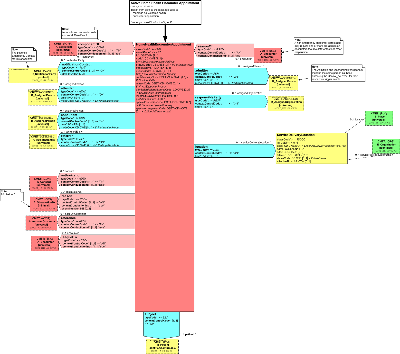
| Parent: | Patient Administration (PRPA_DM000000UV) |
The Active Home Health Encounter Appointment R-MIM defines the message used in notifications about active home health encounter appointments. It is used by both "activate" and "revise" notifications. Descriptions for all classes, attributes and associations in this model can be found in the HMD and Message Type table views.
Encounter Attributes
The focal class (and entry point) is the EncounterAppointment class. The attributes of encounter appointment are:
-
id - the unique identifier for this encounter appointment
-
code = HH, says that is an appointment for an home health encounter
-
statusCode = "active"
-
effectiveTime - the anticipated start and (optional) end time for the scheduled encounter
-
priorityCode - the admission urgency for the scheduled encounter
-
confidentialityCode - a set of codes that control the disclosure of information about this scheduled patient encounter
-
reasonCode - gives an explanation for the encounter appointment, other than the medical reason for the encounter in the pertinentInformation (diagnoses) described below. Examples of values here are "Medical Necessity", "Patient's Request" and "Dependency".
-
admissionReferralSourceCode - a code used to categorize the type of place or organization responsible for the patient immediately prior to their scheduled encounter; for example, in the United States, this is identified in UB-92 Form Locator 20, Source of Adm(ission).
-
lengthOfStayQuantity - expresses the expected quantity of time for the scheduled encounter
-
specialCourtesiesCode - a set of codes identifying special courtesies to be extended to the patient (e.g., no courtesies, extended courtesies, professional courtesy, VIP courtesies).
-
specialArrangementCode - a set of codes indicating the type of special arrangements to be provided for a patient encounter (e.g., wheelchair, stretcher, interpreter, attendant, seeing eye dog).
Links to Other Acts
Encounter appointments can link to other acts:
-
A_AccountGuarantor: the scheduled encounter can be linked to one or more patient accounts. Each account is sent in a separate A_AccountGuarantor CMET.
-
A_ObservationDx: the scheduled encounter can be linked to one or more admission diagnoses . Each diagnosis is sent in a separate A_ObservationDx CMET. Multiple admission diagnoses can be rank ordered using the pertinentInformation.priorityNumber.
-
A_Consent: the scheduled encounter can be linked to one or more consents granted by the patient or the patient's representative. Each consent is sent in a separate A_Consent CMET. Note, this s currently a placeholder CMET until the Medical Records TC completes work on medico-legal document modeling.
Direct Participations in the Scheduled Encounter
A number of entities play roles that participate directly in the scheduled encounter:
-
admitter: the healthcare practitioner that required/authorized the scheduled encounter
-
responsibleParty: a healthcare provider organization that will hold clinical responsibility for the patient at the start of the scheduled encounter
-
location: the patient's assigned location at the start of the scheduled encounter
- reusableDevice: equipment that is required for this scheduled encounter
-
subject: the patient who is the subject of the scheduled encounter
-
referrer: the healthcare practitioner who requested the scheduled encounter to take place
-
consultant: an advisor who will participate in the scheduled encounter by performing evaluations and making recommendations
-
attender: the healthcare practitioner who will have responsibility for overseeing the patient's care at the start of the scheduled encounter
-
notificationContact: the patient's designated Emergency Contact for this scheduled encounter.
| Active Home Health Encounter Appointment | PRPA_HD414001UV02 |
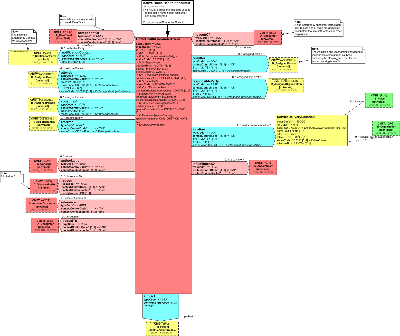
| Parent: | Patient Administration (PRPA_DM000000UV) |
The Active Home Health Encounter R-MIM defines the message used to report that a new home health encounter has started.
HomeHealthEncounterEvent
This information model is for home health patient encounters in the active state. In a home health encounter services are provided or supervised by a practitioner at the patient's residence. Services may include recurring visits for chronic or terminal conditions or visit(s) facilitating recuperation.
The statusCode ("active"), and code ("HH") should be considered fixed. Status changes are communicated using the provided trigger events and a change in encounter type requires completing the existing encounter and activating a new encounter of the appropriate type.
In an active encounter the following, if valued, should be interpreted as anticipated values: the end of the effectiveTime interval, the end of the activityTime interval, the lengthOfStayQuantity, and the dischargeDispositionCode.
Descriptions for all the attributes in this and the other classes in this model can be found in the HMD and Message Type table views.
Links to Other Encounters
Encounters can relate to other encounters in two ways:
-
reasonOf: this can link the focal encounter (target) to one or more pre-admission patient encounters for tests (source). Note that the preAdmitTestInd for the focal encounter should also be set to "true".
-
sequelTo: this can link the focal encounter (source) to a previous encounter (target) for the same patient. Examples include: (1) a patient in an ambulatory encounter is admitted as an inpatient after an evaluation of the seriousness of the patient's condition, (2) an inpatient is discharged from an inpatient encounter directly to an ambulatory encounter as part of the same episode of care, (3) a patient is re-admitted to a healthcare facility.
-
componentOf: this can link the focal encounter (target) to a super-encounter (source) of which it is a component. Examples include: (1) an outpatient visit includes clinical encounters with radiology and clinical specialists, (2) an emergency room visit includes encounters for two non-related issues (blurry vision in the eye and a sprained knee, causing the patient to be sent to an eye specialist and an orthopedist).
Links to Other Acts
Encounters can link to other acts:
-
A_Appointment (inFulfillmentOf): the focal encounter can be linked to the appointment that scheduled it. The scheduled encounter and the actual encounter should have the same value for type in Encounter.code. Activation of the encounter event implicitly changes the status code of the appointment to completed.
-
A_AccountGuarantor (reference): the encounter can be linked to one or more patient accounts. Each account is sent in a separate A_AccountGuarantor CMET.
-
A_ObservationDx (reason): the encounter can be linked to one or more diagnoses. Each diagnosis is sent in a separate A_ObservationDx CMET. The encounter "activate" interaction would send an admission diagnosis (Observation.code of "ADMX" in the A_ObservationDx CMET). Multiple admission diagnoses can be rank ordered using the reason.priorityNumber.
-
A_Consent (authorization): the encounter can be linked to one or more consents granted by the patient or patient's representative. Each consent is sent in a separate A_Consent CMET. Note, this is currently a placeholder CMET until the Medical Records TC completes work on medico-legal document modeling.
Direct Participations in the Encounter
A number of entities play roles that participate directly in the encounter:
-
admitter: the healthcare practitioner that required/authorized the encounter, usually in the case of an inpatient encounter. Note: the admitter here must be the same as the author reported in the HL7 Trigger Event Control Act for the admission.
-
responsibleParty: the healthcare provider organization that holds clinical responsibility for care of the patient during the encounter. The encounter "activate" interaction activates the initial responsibleParty participation.
-
location: the patient's assigned location during the encounter. The encounter "activate" interaction activates the initial active location participation and, optionally, one or more pending location participations. ServiceDeliveryLocation is a role played by a place at which services may be provided. A service delivery location may be either an incidental service delivery location (a place at which services may be provided without prior designation or authorization) or a dedicated service delivery location (a place that is intended to house the provision of services). Dedicated service delivery locations can be further characterized as either clinical (DedicatedClinicalLocationRoleType) or non-clinical (DedicatedNonClinicalLocationRoleType).
-
subject: the patient who is the subject of the encounter.
-
referrer: the healthcare practitioner who requested the encounter to take place.
-
consultant: an advisor participating in the encounter by performing evaluations and making recommendations.
-
attender: the healthcare practitioner who has responsibility for overseeing a patient's care during the patient encounter. The encounter "activate" interaction activates the initial attender participation.
-
notificationContact: the patient's designated Emergency Contact for this encounter.
| Active Home Health Encounter | PRPA_HD404001UV02 |
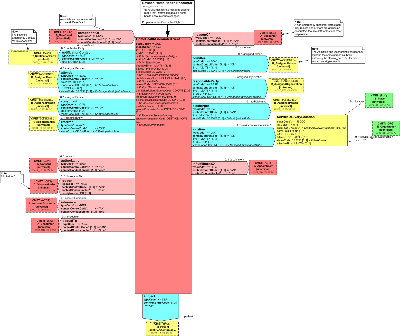
| Parent: | Patient Administration (PRPA_DM000000UV) |
The Revised Home Health Encounter R-MIM defines the message used to report that information about a home health encounter has changed. The home health encounter can be either active or completed.
Descriptions for all classes, attributes and associations in this model can be found in the HMD and Message Type table views.
Differences
The Revised Home Health Encounter R-MIM differs from the Active Home Health Encounter R-MIM in the following ways:
- The HomeHealthEncounterEvent.statusCode attribute can be any value from the ActStatusNormal value set.
- The discharger participation is added to the model since the model applies to active and completed encounters.
| Revised Home Health Encounter | PRPA_HD404002UV02 |
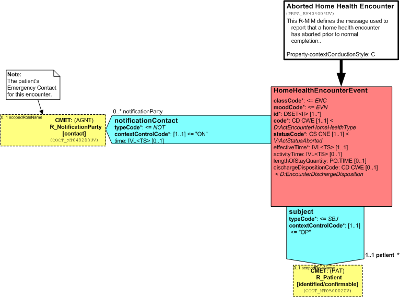
| Parent: | Patient Administration (PRPA_DM000000UV) |
The Aborted Home Health Encounter R-MIM defines the message used to report a home health encounter was aborted prior to normal completion.
The Aborted Home Health Encounter R-MIM includes only the encounter attributes and associations that can be changed by aborting an encounter. The reason the encounter was aborted is conveyed in the Trigger Event Control Act portion of the HL7 composite message. The reasonCode attribute of the ControlActProcess conveys a simple, coded reason. More comprehensive information about why the encounter was aborted may be conveyed in a A_DetectedIssue CMET associated with the ControlActProcess via a reasonOf act relationship.
Descriptions for all classes, attributes and associations in this model can be found in the HMD and Message Type table views.
- The HomeHealthEncounterEvent.statusCode is set to "aborted".
- The HomeHealthEncounterEvent.effectiveTime contains actual values for both start and end date-times instead of an anticipated end date-time.
- The HomeHealthEncounterEvent.activityTime is more likely to contain a value.
- The HomeHealthEncounterEvent.lengthOfStayQuantity, if valued, contains the actual, calculated quantity (the actual days quantity cannot be simply calculated from the admission and discharge dates because of possible leaves of absence) instead of the expected length of stay.
- The HomeHealthEncounterEvent.dischargeDispositionCode, if valued, contains the actual discharge disposition instead of the expected discharge disposition.
- The patient's notificationContact is included to permit sending the emergency contact who was notified when the encounter was aborted.
| Aborted Home Health Encounter | PRPA_HD404004UV02 |
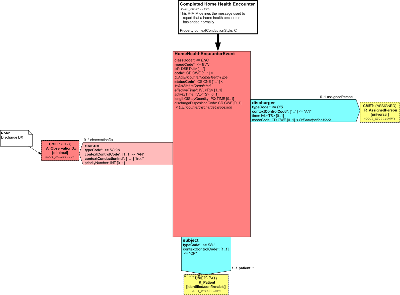
| Parent: | Patient Administration (PRPA_DM000000UV) |
The Completed Home Health Encounter R-MIM defines the message used to report that a home health encounter has ended normally.
Descriptions for all classes, attributes and associations in this model can be found in the HMD and Message Type table views.
The Completed Home Health Encounter R-MIM includes only the encounter attributes and associations that can be changed by encounter completion:
- The HomeHealthEncounterEvent.statusCode is set to "completed".
- The HomeHealthEncounterEvent.effectiveTime contains actual values for both start and end date-times instead of an anticipated end date-time.
- The HomeHealthEncounterEvent.activityTime is more likely to contain a value.
- The HomeHealthEncounterEvent.lengthOfStayQuantity, if valued, contains the actual, calculated quantity (the actual days quantity cannot be simply calculated from the admission and discharge dates because of possible leaves of absence) instead of the expected length of stay.
- The HomeHealthEncounterEvent.dischargeDispositionCode, if valued, contains the actual discharge disposition instead of the expected discharge disposition.
- There is a discharger participation in HomeHealthEncounterEvent. The discharger is the healthcare practitioner that required/authorized the ending of an encounter.
- The reason act relationship can convey one or more discharge diagnoses. Each diagnosis is sent in a separate A_ObservationDx CMET. The reason.priorityNumber specifies rank order if more than one discharge diagnosis is sent. Note that reason refers to the reason for the encounter itself, not the reason for the discharge; that reason would be conveyed in the Trigger Event Control Act.
| Completed Home Health Encounter | PRPA_HD404003UV02 |
|
||||||||||||||
|
For details on the interpretation of this section, see the description of HMDs in the Version 3 Guide.
This HMD defines notification messages about active home health encounter appointments.
| A_EncounterUniversal | COCT_MT010000UV01 |
| A_EncounterUniversal | COCT_MT010000UV01 |
| R_NotificationPartyContact | COCT_MT040203UV09 |
| R_PatientIdentified/confirmable | COCT_MT050002UV07 |
| R_AssignedEntityUniversal | COCT_MT090000UV01 |
| R_AssignedPersonUniversal | COCT_MT090100UV01 |
| R_AssignedPersonUniversal | COCT_MT090100UV01 |
| R_AssignedPersonUniversal | COCT_MT090100UV01 |
| R_AssignedOrganizationUniversal | COCT_MT090200UV01 |
| A_AccountGuarantorUniversal | COCT_MT110300UV04 |
| A_ObservationDxMinimal | COCT_MT120104UV |
| E_OrganizationIdentified | COCT_MT150001UV01 |
| A_ConsentUniversal | COCT_MT470000UV |
| A_CareEventIdentified | COCT_MT520001UV |
| E_PlaceUniversal | COCT_MT710000UV07 |
| Active Home Health Encounter Appointment | PRPA_MT414001UV02 |
This HMD defines the message used to report that a new home health encounter has started.
| A_EncounterUniversal | COCT_MT010000UV01 |
| A_EncounterUniversal | COCT_MT010000UV01 |
| A_AppointmentUniversal | COCT_MT020000UV01 |
| R_NotificationPartyContact | COCT_MT040203UV09 |
| R_PatientIdentified/confirmable | COCT_MT050002UV07 |
| R_AssignedEntityUniversal | COCT_MT090000UV01 |
| R_AssignedPersonUniversal | COCT_MT090100UV01 |
| R_AssignedPersonUniversal | COCT_MT090100UV01 |
| R_AssignedPersonUniversal | COCT_MT090100UV01 |
| R_AssignedOrganizationUniversal | COCT_MT090200UV01 |
| A_AccountGuarantorUniversal | COCT_MT110300UV04 |
| A_ObservationDxMinimal | COCT_MT120104UV |
| E_OrganizationIdentified | COCT_MT150001UV01 |
| A_ConsentUniversal | COCT_MT470000UV |
| A_CareEventIdentified | COCT_MT520001UV |
| E_PlaceUniversal | COCT_MT710000UV07 |
| Active Home Health Encounter | PRPA_MT404001UV02 |
This HMD defines the message used to report that information about an home health encounter has changed.
| A_EncounterUniversal | COCT_MT010000UV01 |
| A_EncounterUniversal | COCT_MT010000UV01 |
| A_AppointmentUniversal | COCT_MT020000UV01 |
| R_NotificationPartyContact | COCT_MT040203UV09 |
| R_PatientIdentified/confirmable | COCT_MT050002UV07 |
| R_AssignedEntityUniversal | COCT_MT090000UV01 |
| R_AssignedPersonUniversal | COCT_MT090100UV01 |
| R_AssignedPersonUniversal | COCT_MT090100UV01 |
| R_AssignedPersonUniversal | COCT_MT090100UV01 |
| R_AssignedPersonUniversal | COCT_MT090100UV01 |
| R_AssignedOrganizationUniversal | COCT_MT090200UV01 |
| A_AccountGuarantorUniversal | COCT_MT110300UV04 |
| A_ObservationDxMinimal | COCT_MT120104UV |
| E_OrganizationIdentified | COCT_MT150001UV01 |
| A_ConsentUniversal | COCT_MT470000UV |
| A_CareEventIdentified | COCT_MT520001UV |
| E_PlaceUniversal | COCT_MT710000UV07 |
| Revised Home Health Encounter | PRPA_MT404002UV02 |
This HMD defines the message used to report that a home health encounter was aborted prior to normal completion. It includes only enough information to identify the aborted encounter and the reason it was aborted.
| R_NotificationPartyContact | COCT_MT040203UV09 |
| R_PatientIdentified/confirmable | COCT_MT050002UV07 |
| Aborted Home Health Encounter | PRPA_MT404004UV02 |
This HMD defines the message used to report that a home health encounter has ended normally.
| R_PatientIdentified/confirmable | COCT_MT050002UV07 |
| R_AssignedPersonUniversal | COCT_MT090100UV01 |
| A_ObservationDxMinimal | COCT_MT120104UV |
| Completed Home Health Encounter | PRPA_MT404003UV02 |
|
||||||||||||||||||
|
For details on the interpretation of this section, see the definition of Interactions in the Version 3 Guide.
This interaction occurs after a home health encounter appointment is scheduled. An informer sends to a tracker a complete home health appointment record, including related acts and participations.
| Trigger Event | Home Health Encounter Appointment Scheduled | PRPA_TE414001UV02 |
| Transmission Wrapper | Send Message Payload | MCCI_MT000100UV01 |
| Control Act Wrapper | Trigger Event Control Act | MCAI_MT700201UV01 |
| Message Type | Active Home Health Encounter Appointment | PRPA_MT414001UV02 |
| Sender | Home Health Encounter Appointment Rev Informer | PRPA_AR414001UV02 |
| Receiver | Home Health Encounter Appointment Rev Tracker | PRPA_AR414002UV02 |
This interaction occurs after a home health encounter appointment is revised before the encounter has started. An informer sends to a tracker a complete home health appointment record, including related acts and participations.
| Trigger Event | Home Health Encounter Appointment Revised | PRPA_TE414002UV02 |
| Transmission Wrapper | Send Message Payload | MCCI_MT000100UV01 |
| Control Act Wrapper | Trigger Event Control Act | MCAI_MT700201UV01 |
| Message Type | Active Home Health Encounter Appointment | PRPA_MT414001UV02 |
| Sender | Home Health Encounter Appointment Rev Informer | PRPA_AR414001UV02 |
| Receiver | Home Health Encounter Appointment Rev Tracker | PRPA_AR414002UV02 |
This interaction occurs after a home health encounter starts. An informer sends to a tracker a complete emergency encounter record, including related acts and participations.
| Trigger Event | Home Health Encounter Started | PRPA_TE404001UV02 |
| Transmission Wrapper | Send Message Payload | MCCI_MT000100UV01 |
| Control Act Wrapper | Trigger Event Control Act | MCAI_MT700201UV01 |
| Message Type | Active Home Health Encounter | PRPA_MT404001UV02 |
| Sender | Home Health Encounter Comprehensive Informer | PRPA_AR404001UV02 |
| Receiver | Home Health Encounter Comprehensive Tracker | PRPA_AR404002UV02 |
This interaction occurs after information about a home health encounter changes (except for changes to Attending Practitioner, Patient Location and Responsible Organization participations that cause separate interactions). An informer sends to a tracker a complete emergency encounter record, including related acts and participations.
| Trigger Event | Home Health Encounter Revised | PRPA_TE404002UV02 |
| Transmission Wrapper | Send Message Payload | MCCI_MT000100UV01 |
| Control Act Wrapper | Trigger Event Control Act | MCAI_MT700201UV01 |
| Message Type | Revised Home Health Encounter | PRPA_MT404002UV02 |
| Sender | Home Health Encounter Comprehensive Informer | PRPA_AR404001UV02 |
| Receiver | Home Health Encounter Comprehensive Tracker | PRPA_AR404002UV02 |
This interaction occurs after a home health encounter is aborted prior to completion. This could have been result of action by either the practitioner or the patient. An informer sends to a tracker information about the end of the encounter and the reason the encounter was aborted.
| Trigger Event | Home Health Encounter Aborted | PRPA_TE404004UV02 |
| Transmission Wrapper | Send Message Payload | MCCI_MT000100UV01 |
| Control Act Wrapper | Trigger Event Control Act | MCAI_MT700201UV01 |
| Message Type | Aborted Home Health Encounter | PRPA_MT404004UV02 |
| Sender | Home Health Encounter Comprehensive Informer | PRPA_AR404001UV02 |
| Receiver | Home Health Encounter Comprehensive Tracker | PRPA_AR404002UV02 |
This interaction occurs after a home health encounter ends. An informer sends to a tracker a complete home health encounter record, including related acts and participations.
| Trigger Event | Home Health Encounter Completed | PRPA_TE404003UV02 |
| Transmission Wrapper | Send Message Payload | MCCI_MT000100UV01 |
| Control Act Wrapper | Trigger Event Control Act | MCAI_MT700201UV01 |
| Message Type | Completed Home Health Encounter | PRPA_MT404003UV02 |
| Sender | Home Health Encounter Comprehensive Informer | PRPA_AR404001UV02 |
| Receiver | Home Health Encounter Comprehensive Tracker | PRPA_AR404002UV02 |
This notification occurs after a previously reported Home Health Encounter Started notification interaction is nullified. Note that the payload is the Act Generic Status - Event message type from the Shared Messages domain.
| Trigger Event | Home Health Encounter Nullified | PRPA_TE404999UV02 |
| Transmission Wrapper | Send Message Payload | MCCI_MT000100UV01 |
| Control Act Wrapper | Trigger Event Control Act | MCAI_MT700201UV01 |
| Message Type | Act Generic Status - Event | COMT_MT001103UV01 |
| Sender | Home Health Encounter Comprehensive Informer | PRPA_AR404001UV02 |
| Receiver | Home Health Encounter Comprehensive Tracker | PRPA_AR404002UV02 |
| Return to top of page |

